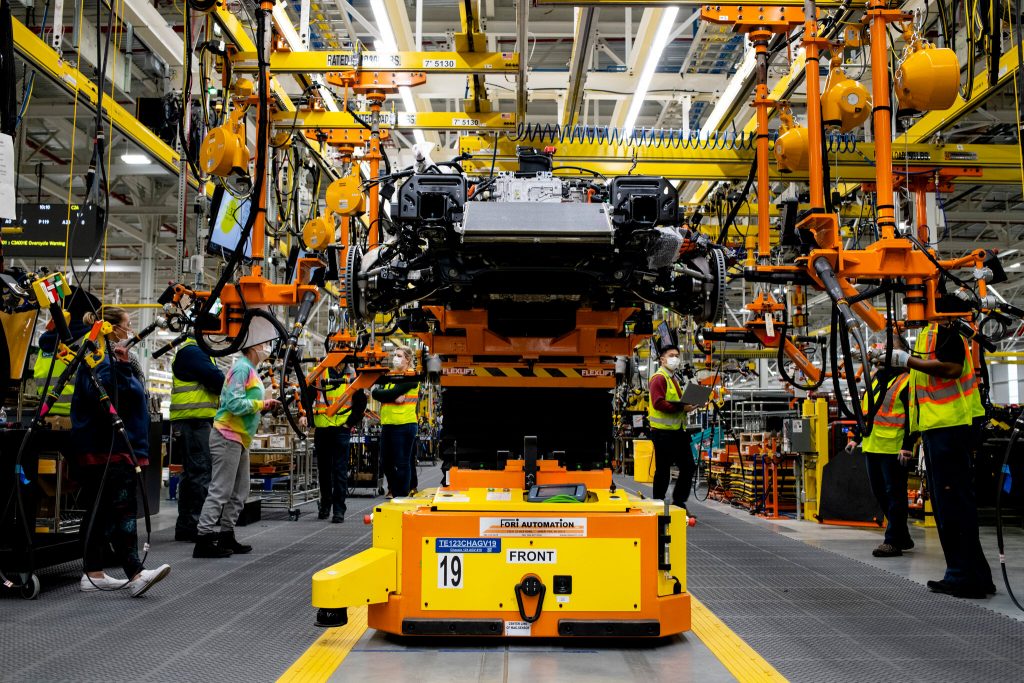As thousands of United Auto Workers (UAW) members walk out and thousands more prepare to join them in the coming days, one seemingly unusual contract demand is gaining a lot of attention and ruffling a lot of corporate feathers. In addition to higher wages, improved pensions for all, cost of living increases, and an end to the awful two-tier wage system negotiated by the previous union leadership in 2007, the UAW has revived an old demand: a 32-hour work week for 40 hours of pay. If achieved, it could improve the lives of auto workers and prevent the loss of thousands of jobs as the industry transitions to the less labor intensive production of electric vehicles.
That such a demand is being put forward again now, after decades of neoliberal austerity that decimated labor unions around the globe, is a sign of just how emboldened working people and their organizations have become in the wake of the 2020 pandemic, and just how much the general consciousness of working people has shifted in the last several years. A demand that would have been seen as ambitious for even radical activists ten years ago (think Occupy Wall Street) is now part of a platform of demands by one of the nation’s biggest unions in one of the country’s most important and competitive industries. This core demand, which was largely abandoned by unions decades ago, goes to the heart of the very idea of what work is and how we, as human beings, choose — and often do not get to choose — how we use our labor.
While dismissed by corporate CEOs and media pundits as “pie in the sky,” and a “non-starter,” the demand for a 32-hour workweek is grounded in the same logic that drove many of the earliest union struggles: the fight for more free time, and to be able to have a life and not be always tied to the bosses’ yoke — that is, the fight for an eight-hour workday, which even still today remains beyond the reach of many workers. This logic was eloquently articulated by the UAW’s new president, Shawn Fain, in a speech to auto workers on August 1:
The greatest resource in this world to a human being is time, because each of us is only given a finite precious amount. And that’s what wages are all about. No matter what type of work somebody does, you’re being paid for your time, and that should be the focus of everything going forward…If this awful pandemic taught us anything, it is that there is more to life than just work. It’s not enough to just survive, we should all have a right to thrive. I believe all of us have a right to look back on our life and not regret spending so much of our time making hundreds of billions of dollars for greedy companies rather than spending time with our families and friends.
And indeed, many auto workers are working 60 hours or more per week, sometimes 7 days a week, just to get by, often trading away time they would otherwise have been able to spend with their families or friends.
As Stellantis autoworker Charles Mitchell told The Guardian: “The ability for an autoworker to provide for a family or even oneself has been more and more difficult. All the while companies are becoming more profitable and making shareholders richer while forcing mandatory 60- to 70-hour work weeks in assembly plants.”
Thanks to these grueling working conditions and long work hours, Stellantis, General Motors (GM), and Ford continue to make massive profits. Between 2013 and 2022, the Big Three made collective profits of nearly $250 billion and a combined profit of $21 billion in just the first six months of 2023. That’s about $140,000 in profit per UAW worker in just the first half of the year.
And of course, the situation of these workers contrasts dramatically with the luxury life of the Big Three CEOs. GM CEO Mary Barra received an annual compensation of nearly $29 million in the last fiscal year. In 2022, Jim Farley, the CEO of Ford, received total compensation amounting to almost $21 million, and Carlos Tavares, the CEO of Stellantis, was granted nearly $25 million in compensation — hundreds of times what even the highest paid line worker earns producing Jeep Grand Cherokees in Detroit.
While it remains an open question whether the strike will continue until this demand is met, it has already had the progressive effect of raising workers’ aspirations and changing the way they think about their relationship to work. But this demand also challenges the long-held logic that some layoffs are just inevitable, and the idea, still put forward by many in the industry, that what is good for the company must be good for the worker.
This demand also challenges the false notion that technological advancement means fewer jobs or lower wages. Instead of allowing layoffs, this demand, if won, would allow workers to remain employed while simultaneously alleviating their heavy workloads and long hours. It would also create new opportunities for the currently unemployed, temporary, or part-time workers to win job security and better wages by becoming full-time.
More Productivity Should Mean More Time Off
Due to automation and rapid technological advancements, we are now able to produce a greater quantity of goods and services in a shorter amount of time. This historical pattern indicates a consistent increase in productivity. However, there is a big contradiction: despite the decrease in the time required to produce necessities, there has been little to no reduction in working hours and, with falling wages and rising inflation, the amount of time the average person has to work to earn a living wage has only increased. Machinery, robots, and technological developments in general, although they are the result of human collective knowledge and work, are not used to make life easier, but only to create more profits. Under the capitalist system, their benefits are appropriated by a few and are used by capitalists to increase labor discipline, reduce idle time, and extract from workers as much working time as possible.
Indeed, the capitalist system sees labor as merely a means to an end and its only horizon is the continued generalized impoverishment and fragmentation of the working class. Parallel to the unemployment that throws millions of people into poverty, the phenomenon of formal wage earners who are poor, and those who barely make ends meet in exchange for the vast portion of their waking hours, is becoming more and more widespread.
Against this fate, the reduction of the working day and the distribution of working hours between the employed and the unemployed at a national scale could open a horizon for improving the lives of the majority of the country’s population.
A Socialist Approach
The strike at the Big Three could eventually involve over 150,000 UAW workers nationwide and is being followed by millions of people in the United States and abroad. Political leaders in several other countries have proposed four-day work weeks while some corporations have been doing experiments to show that reducing working hours could be good for them as well as workers. In fact, many progressive lawmakers behind these proposals try to show how workers can be more productive and lucrative for corporations if they have more time to rest and are “happier” at work. But the demand for a shorter work week is not about convincing corporations that workers will still be productive to keep their millions in profits still flooding in — it’s about taking back the profits that working people produce and using them to create more jobs and gain more free time for themselves.
As Esteban Mercatante points out:
The emphasis placed on highlighting the productive benefits that can be expected to society (capitalist, in case it is necessary to clarify it) from a reduction of the working day denotes the profoundly productivist bias with which the question is approached. Nothing to do with a horizon of freeing oneself from the burden of work. Of course, this does not mean, far from it, that the encouraging results publicized by the Icelandic government will be greeted with unanimous enthusiasm by employers – far from it. Although modern economics strives to disprove the connection between exploitation of labor and profit demonstrated by Marx, the “owners” of capital and their CEOs know well, from experience, that labor is the only source of value. Surplus value is the value produced in that part of the working day that exceeds the time during which workers produce value equivalent to what they receive as wages. Without this surplus, no profit is possible. And here, every hour, minute and second counts. For the capitalists it is not a question of accepting “compensations” in order to remain equal, but of enlarging the portion of surplus value.
For society-wide progress, the implementation of a shorter workweek should not stop with UAW’s demand and its members only. The demand for a shorter work week has to be tied to the problem of underwork, which is the more pressing problem for many in the United States who want full-time jobs but are either unemployed or can only find part-time employment.
In the United States, overall productivity has increased by 299 percent since 1950, but this has not translated into higher wages or shorter work weeks. Indeed, the discrepancy between productivity and wages has become so acute that even bourgeois economists have been forced to admit that productivity gains have largely gone “into the salaries of highly paid corporate and professional employees…[and] higher profits (i.e., toward returns to shareholders and other wealth owners).” And these corporations are not going to peacefully give away those huge profits without a fight. In that sense, the UAW demand for reducing work time with the same pay can be a great example for the working class as a whole.
The great advances of the productive forces (railroads and machines, and now, robotized production and artificial intelligence) do not belong to any one person or corporation. They are a product of joint human action, knowledge, and labor, which is itself only made possible by the ongoing labor of millions of others who help to care for, feed, educate, and house all of those who make such technological advances possible. It is general knowledge that controls and contributes to the process of social life and the fruits of that knowledge must be shared with everyone that contributes to its production.
The material conditions are in place for everyone to live better and work less. For this reason, human cooperation, expressed in machines and new technologies, must be freed from the obstacles imposed by the private ownership of the means of production and exchange: the strategic resources of the economy, such as the large agro-industries, the main steel and automobile factories, the ports, the large estates, the banking system, and others should be placed under the control and collective management of workers in order to promote their development and put them at the service of social needs.
The UAW’s bold demand for a 32-hour work week raises fundamental questions about the relationship between labor and productivity and about the nature of work itself, but we cannot stop with just the Big Three. Every worker everywhere deserves a shorter work week and higher wages. Winning such a demand will require the coordinated efforts and work actions of the unions as well as the entire working class, including non-unionized workers, immigrants, and the unemployed. This is why it is so imperative, in this moment of increasing frustration and discontent with the failed system of capitalism, that working people and unions break ties with the Democrats and the Republicans and fight to build a truly independent working-class party with a socialist platform.












